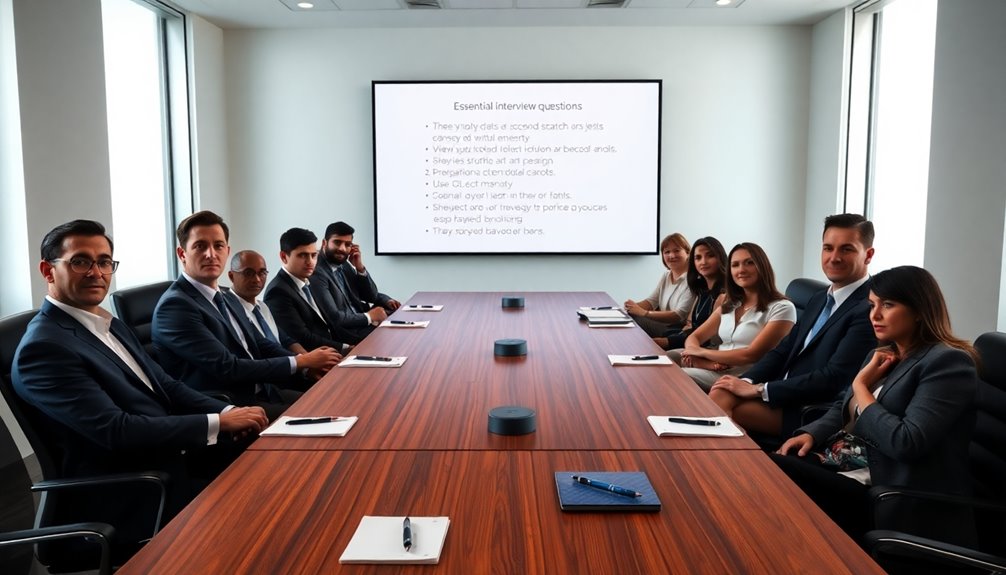To find ideal candidates, ask essential interview questions that reveal their skills, motivations, and personality traits. Start with basic inquiries about their background and values. Explore their work history to understand responsibilities and career motivations. Assess their fit within your team by discussing stress management and work preferences. Gauge their industry knowledge by asking about current trends and challenges. Use behavioral questions to uncover past experiences that showcase their problem-solving abilities. These insights will help you make informed hiring decisions. There's more to uncover about effective questioning techniques that can enhance your interview process.
Key Takeaways
- Ask about candidates' motivations to ensure alignment with company values and culture.
- Explore strengths and weaknesses to assess self-awareness and personal growth.
- Discuss past work history to understand responsibilities, achievements, and career progression.
- Use behavioral questions to evaluate problem-solving skills and emotional intelligence in real-life scenarios.
- Inquire about industry knowledge to gauge awareness of trends and adaptability to changes.
Basic Interview Questions

When you sit down for an interview, basic questions often set the tone for the entire conversation. These initial inquiries usually cover your personal background, helping the interviewer gauge who you're beyond your resume.
You might be asked to describe yourself using a few key words, which can reveal your character traits. Expect questions about your motivation for applying to the job—this gives insight into your alignment with the company's values.
Additionally, the interviewer may explore your perceived strengths and weaknesses, allowing you to reflect on your self-awareness.
Finally, discussing your goal-setting methods can demonstrate your ambition and planning capabilities, showcasing how you envision your professional future.
Work History Insights

Your work history tells a compelling story about your professional journey and the skills you've acquired along the way. When discussing your past roles, be ready to outline your responsibilities and the impact you'd on your previous teams or projects.
Employers want to understand why you left each position, as this can reveal your career motivations and values. If you have gaps in your employment, address them honestly and focus on what you learned during that time. Financial strain can often be a factor in career transitions, so it's important to articulate your situation clearly. Understanding how to navigate disputes can also be beneficial, as it reflects your ability to handle conflicts in the workplace. Conducting thorough background checks on potential candidates is essential for ensuring workplace safety and compliance.
Highlight any educational achievements or training that furthered your expertise. This insight not only showcases your qualifications but also demonstrates your commitment to personal and professional growth, making you a more attractive candidate. Additionally, showcasing your ability to navigate small mistakes can illustrate your resilience and capacity for learning from experiences.
Personality Assessment

Personality assessments play an essential role in interviews, offering insights into how candidates might fit within a team and adapt to workplace dynamics. By asking targeted personality questions, you can gauge a candidate's preference for teamwork versus independence and their individual communication style.
Understanding their work ethic from the perspective of others provides valuable context on how they might integrate into your organization. Additionally, discussing stress management techniques reveals how they handle pressure and setbacks.
These insights not only help you determine if a candidate aligns with your company culture but also assess their potential for growth within the team. In short, personality assessments are vital for making informed hiring decisions that benefit both the candidate and your organization.
Industry Knowledge

Understanding industry knowledge is essential for candidates aiming to succeed in their roles. It demonstrates not only your awareness but also your commitment to the field.
When interviewing, consider these key points:
- Trends and Changes: Share insights on current trends and potential shifts in the industry.
- Challenges: Discuss significant challenges the industry faces and your thoughts on overcoming them.
- Adaptation: Explain how you've adapted to changes in your industry in the past. For example, many professionals are leveraging predictive modeling to better understand and respond to student needs.
- Continuous Learning: Highlight methods you use to stay updated, such as following industry news or attending conferences. Additionally, being aware of AI-driven personalization can help you understand how technology is shaping learning experiences in various sectors.
Behavioral Analysis

Behavioral analysis plays an essential role in interviews, as it gives you insight into how candidates handle real-life situations and interact with others. By asking behavioral interview questions, you can uncover specific examples of past experiences that demonstrate a candidate's skills, adaptability, and decision-making abilities.
Focus on scenarios that reveal how they've managed conflicts, collaborated with diverse teams, or prioritized tasks under pressure. This method allows you to gauge their emotional intelligence, problem-solving skills, and overall fit within your organization. Incorporating questions about rebuilding trust can provide additional insights into their approach to conflict resolution and collaboration.
Pay attention to not just the content of their answers, but also their thought processes and attitudes. Ultimately, behavioral analysis helps you predict future performance based on past behavior, which is vital for selecting the ideal candidate.
Creative Icebreakers

While interviews can often feel intimidating, incorporating creative icebreakers can help set a relaxed tone and encourage open communication.
These fun questions not only lighten the mood but also reveal insights about the candidate's personality. Consider these engaging icebreakers:
- If you could have dinner with any historical figure, who'd it be and why?
- What's the last book you read that really inspired you?
- If you were an animal, what would you be and how would it represent you?
- Share a quirky or interesting fact about yourself that most people don't know.
Using these questions can foster a more comfortable atmosphere, allowing you to get to know your candidate beyond their resume.
Challenging Scenarios

Challenging scenarios during interviews can test a candidate's ability to think on their feet and handle pressure. You might encounter questions that push your limits, like justifying why you're the ideal hire despite a lack of direct experience.
Be prepared to discuss sensitive personal information or reflect on career changes you'd make if given another chance. Defining your version of personal success can also reveal how aligned you're with the company's values.
In addition, identifying tasks you disliked in previous roles can show your ability to acknowledge weaknesses. These questions require you to articulate your thoughts clearly and demonstrate resilience, ultimately providing insight into how you'd navigate real-world challenges in the workplace.
Understanding emotional dysregulation can help you better manage your responses during these challenging discussions.
Stay calm, and think critically!
Final Interview Considerations

How can you guarantee you're fully prepared for the final interview? You need to refine your approach and confirm you leave a lasting impression. Here are four key considerations:
- Research the Company: Understand their values, culture, and recent developments. This indicates your genuine interest.
- Prepare Questions: Have thoughtful questions ready. This illustrates your engagement and enthusiasm to contribute.
- Dress Appropriately: Your attire should reflect the company's environment, balancing professionalism with comfort.
- Practice Responses: Anticipate tough questions and rehearse your answers, focusing on clarity and confidence.
Frequently Asked Questions
What Unique Skills Do You Bring to This Role?
When you think about the unique skills you bring to this role, consider your strengths that set you apart. You might excel in problem-solving, communication, or creative thinking.
Reflect on specific experiences where these skills made a difference. Maybe you've led projects successfully or navigated challenges with innovative solutions.
Highlight how these abilities can contribute to the team's success and align with the company's goals, showcasing your value and potential impact.
How Do You Prioritize Your Tasks?
You know that feeling when everything seems urgent? That's when you embrace a clear method.
You start by listing tasks, distinguishing between what's important and what's just noisy. You tackle high-impact items first, setting realistic deadlines.
Regularly reassessing priorities helps you adapt to changes, ensuring you stay focused. By creating a structured yet flexible approach, you not only manage your workload but also reduce stress, making every day feel more productive and fulfilling.
Describe a Time You Overcame a Significant Challenge
Think about a time you faced a significant challenge.
Maybe you were juggling multiple deadlines or dealing with a difficult team member. Reflect on how you approached the situation, what steps you took to overcome the obstacle, and the skills you utilized.
By sharing this experience, you demonstrate resilience and problem-solving abilities, which are essential in any role.
Highlighting your adaptability shows you're ready to tackle future challenges effectively.
What Motivates You to Excel in Your Work?
When you think about what motivates you to excel in your work, consider your passions and goals. You might feel driven by the desire to learn new skills or contribute to a team's success.
Maybe the satisfaction of overcoming challenges fuels your ambition. Reflect on how recognition from peers or achieving personal milestones inspires you to push your limits.
Ultimately, it's about finding purpose and enjoying the journey in your professional life.
How Do You Handle Feedback and Criticism?
When you receive feedback and criticism, take a moment to listen and absorb what's being said.
You don't shy away from it; instead, you view it as an opportunity for growth.
Reflect on the feedback, and identify specific areas for improvement.
You ask questions to clarify when needed, and you're not afraid to implement changes based on that input.
This proactive approach helps you enhance your skills and build stronger relationships.
Conclusion
In summary, asking the right questions is like shining a spotlight on a candidate’s true potential. By exploring their background, work history, and personality, you can uncover the gems that will elevate your team. Remember, each interview is an opportunity to connect and discover what makes each candidate unique. So, embrace these essential questions, and you’ll not only find the ideal fit but also foster a thriving workplace culture that drives success. To ensure that you’re asking the right questions, it’s important to focus on the essential success questions that will reveal a candidate’s strengths, weaknesses, and potential contributions to the team. By delving into these key areas, you can gain valuable insights that will guide your hiring decisions and contribute to a more dynamic and cohesive workforce. Ultimately, the right questions can lead to the right people, and the right people can drive your organization’s success.









